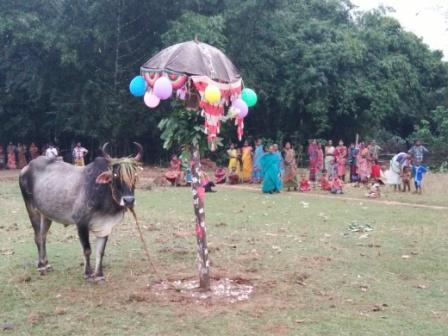Kaptipada: When people all over the country and outside celebrate Diwali, festival of lights, on Kartik Amabasya, Kudumi community in Kaptipada area in Mayurbhanj district celebrate it in a unique way. They worship cattle ‘Go Bandana’ to mark the celebration of lights.
The festival, ‘Go Bandana’ or ‘Gothani Parva’, is celebrated for five days, beginning Diwali.
Kudumis are spread in scores of villages straddling Mayurbhanj, Keonjhar and Sundargarh districts.
Other tribal communities like Mohant, Lalindi, Bagla, Kambhar Munda, Bhumija, Bathudi, Lodha, Mahali and Oraiganda call this festival Bandana Parba.
‘Gothani’ literally means ‘Gotha’, a common place where villagers gather their cows in the morning before they go grazing and again in the evening before heading back to their sheds.
Prior to the festival, villagers clean and decorate their houses, cowsheds and ‘Gotha’. They bring their cattle to the Gothani; smear their heads with vermillion and flowers. Then the village priest carries out a puja at the Gotha, treating an egg as god. After the puja, the villagers offer a cock. The priest then places an egg before the cattle and then they are let loose. The cow that tramples the egg is considered lucky and blessed.
The villagers garland the cow and its owner. Both are taken around the village in a procession amid singing, dancing and beating of drums.
The villagers also visit the house of the owner, who serves food to guests. “This is a traditional festival linked with agriculture. Since cultivation is our livelihood, cows play an important role in promoting farming,” locals said.
During the festival, seven to nine birds of different colours are sacrificed at the altar of the local deities to protect the crops and cattle from different diseases.
According to tribal legends, when Lord Nirakar Shiva (Bara Pahar) created men, he had to provide food for a long time. Human population grew fast, Lord Shiva told them to produce their own food by cultivating land. But agricultural implements and technology were not available then. They faced difficulties and sought Lord’s suggestion. Lord Shiva took pity on them and provided some cattle on condition that the animals should be paid due care and respect.
Initially, the relationship between the animals and humans was cordial. But it continued to worsen while animals were subjected to beating. The cattle had no alternative.
Cattle complained to Nirakar Shiva of heavy work, long working hours, lack of proper food, unhygienic dwelling place, severe beating by human beings, no recreation and no thanks for their contribution. The Lord had a patient hearing of the complaint and assured them that he would inspect secretly on the night of Kartik Amabasya.
The intelligent men became alert and made thorough preparation to clean their houses as well as the cowshed.
On the day of Amabasya, the cattle were washed and smeared with oil and vermilion on their horns and foreheads. They were given sufficient fodder and the cowsheds were illuminated with a burning diya (earthern lamp) throughout the night.
Bundles of grass along with diyas lay on both sides of the entrance of cowsheds. ‘Sohrai’ grass on ‘Chhain’ (roof) is symbolic to the availability of surplus food for the cattle. The complaint could not be proved.
The cattle in the next season complained of the similar hardship and hence Lord Shiva was bound to make a second visit on the same day. Since then, the process has been continuing as a tradition in the name of Bandana Parab.
PNN
